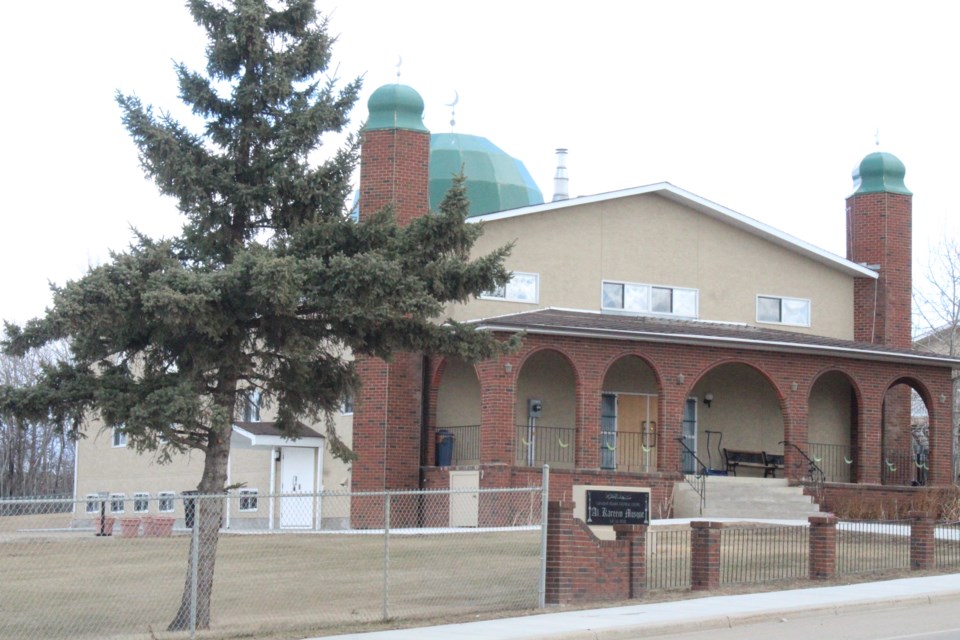LAC LA BICHE - For Muslim families around the world, the month-long celebration of Ramadan is a time for charity and togetherness. Ramadan began this past Friday — at the end of the fifth week of strict social distancing precautions due to the worldwide Covid-19 pandemic.
In Lac La Biche, a community that has been known as having the largest per-capita population of Muslim people in Canada, COVID has forced many adjustments to the holiest month of the Muslim calendar. Day-long fasts of food and drink that starts at sunrise are historically honoured after each sunset with meals shared with family and friends. Thanks to the pandemic precautions, large gatherings are no longer permitted.
Up to half a dozen prayer times each day are followed during the month of Ramadan, but due to restrictions on public attendance, mosque gatherings of more than 15 people are not allowed. Charitable acts towards community members, like sharing food and gifts, are encouraged and flourish throughout the month. Again, due to the COVID pandemic the way that many of those community contacts occur have changed.
Lac La Biche Muslim Association President Ali Fyith says that while the community’s mosque — the second oldest in Western Canada — has been affected by the mandated social gathering restrictions, the charitable and spiritual aspects of Ramadan continue. In fact, said Fyith, because of the COVID pandemic, Ramadan’s tradition of charity seems even stronger.
“We are all in this together. Whoever needs help, we are there to help our community, not only to our members, but the entire community,” said Fyith putting extra emphasis on helping to put food on the tables of those who need it. “We don’t want to see our neighbours hungry, anytime of the year, and especially now.”
Helping with food
Local Muslim association members recently distributed 150 food hampers for an Easter food drive for any community members in need. Fyith said another hamper project is planned during Ramadan.
For their own members, Fyith said this COVID Ramadan has created some particular challenges to overcome.
“We are praying from home and praying with our own family at home,” he said, likening some aspects of the social distancing challenges to the Ramadan fasting and self-reflection. “Isolation can be similar to fasting all day; you put yourself in low gear … with lots of reflection. You have time to think about yourself and others.”
For their own members in need of help during the challenges of the COVID precautions, Fyith said the community’s Imam is available for calls and virtual visits. One-on-one visits at the mosque, with social distancing protocols in place, are also available. As well, families are using virtual chats with other households during the day and at the fast-breaking meal at the end of the day.
There are many changes this year, said Fyith — but the central aspects of Ramadan and the Muslim culture remain strong.
“We are adjusting to times that are not normal … but regardless of COVID, we should all focus on acts of kindness and each other. We are all in this together.”
That community connection will spread and link across Canada if an education project created by three women with Lac La Biche roots takes hold. Salame Fayad, Hadla Assaf and Majeda Fyith are promoting Iftar from Afar — Iftar being the name for breaking fast. The project is hoped to build a network across the county educating people that Ramadan practices can still be held — with COVID precautions in mind.
Fayad, who now calls London, Ontario home, Assaf in Athabasca, and Fyith in Edmonton hope to spread the message of social distancing while families spread the message of Ramadan.
“The Ramadan spirit is often centered around a month of increased worship in mosques, fasting, charity and communal gatherings to break the fast,” said Iftar from Afar founder Fayad. “Given our collective current reality, the community aspects of Ramadan will not be possible.”
Education on Ramadan changes
Some specifics of the Iftar From Afar plan encourages families to deliver charitable food donations through porch drop offs and enjoy meals while breaking the fast virtually with loved ones.
Fyith says the project is about community. Not just the Muslim community, but all communities.
“We are trying to spread this message as far as we can. We know this is all something new and we want everyone to feel that there is still that community around us,” said Fyith.
The Iftar from Afar program has virtual links on Instagram @Iftarfromafar.
Lac La Biche Imam Mohamed encourages the program and says more education about the unique challenges of this year’s Ramadan are welcome.
“This has all been very new. People have been distressed, especially the elderly in the community,” the Imam told the POST on Sunday, explaining that COVID health precautions left many people feeling alone. “Many people need guidance.”
As the weeks have gone by, the Imam senses a gradual acceptance in his members and across the community. And despite the changes to a spiritual celebration that has lasted centuries, he tries to see some positive aspects. He says the efforts to help those having trouble coping has united the community, and made many appreciate life in a different way. “I think it’s been an awakening … an education.”
In the weeks to come — through Ramadan and the Coronavirus pandemic — Imam Mohamed hopes to see more acts of kindness and community charity in the face of adversity.
“This is a once-in-a-lifetime experience that we can learn from.”



